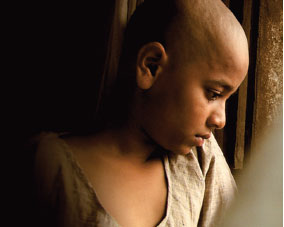In the doc: A column on documentaries
Film: VITTHAL
Director: VINOO CHOLIPARAMBIL
OPENING FRAMES and first lines betray the creator’s skill in his craft like nothing else. Vitthal’s opening frame — a few drops of water fall on a roadside puddle as a cycle whizzes past — is a definitive marker of filmmaker Vinoo Choliparambil’s ability to carve that lasting impression in our minds. But then it would be unfair to reduce his brilliance to the first frame.
 New kid on the block Aniket Rumade shows remarkable restraint in the protagonist’s role
New kid on the block Aniket Rumade shows remarkable restraint in the protagonist’s roleVitthal is a sparse film — there is an economy of words, of scenes — as Choliparambil tells us the story of a 12-year-old, Vitthal (Aniket Rumade), deeply affected by a ritualistic practice that he cannot comprehend. A death in the family demands that sons and grandsons shave their heads and in the opening scene, Vitthal pleads with his mother to be spared the ordeal. When his cries are disregarded, he resorts to tantrums. At theshraadh ceremony, when asked to pay his respects to the dead grandfather, Vitthal’s response is one of anger. He wallows in self-pity as only a child can; a pink cap that he tries on doesn’t fit right. Neither magician nor God can answer his prayers. Driven to action, Vitthal pounces on his little brother whose innocent fascination for a bald head is crushed under angry petulance.
Throughout the 24-minute film, there are three instances when Vitthal talks and none of them are momentous occasions. Vitthal’s facial expressions and body language are taut — there is no excess here as he throws a tantrum and refuses to eat or suffers humiliation at the hands of his schoolmates. If we applaud Rumade’s restraint and familiarity with his craft, then cheer we must the director’s construction of scenes. In one particularly understated scene, Vitthal is framed against the wall, gazing into the distance. There is a slight movement as the breeze catches his sleeve and a curtain flaps in the foreground. Grief like nothing else. In the film’s publicity material, Vitthal is inaccurately described as an angry child. But it is the intense loneliness in his grief that leaps out at us.
When the last frame freezes and the credit roll begins, it is an unwelcome end. There is an intensity to the film that we could have done more with.
There is an intensity to the brief 24-minute film that we could have done more with
As a comment on meaningless ritualistic practices, the film doesn’t score high. There are far more powerful cinematic explorations. But as a film that places children at the centre of this debate, Vitthal succeeds. Not surprisingly, Choliparambil won this year’s National Award for Best Debut Director.
—
This article was originally published in Tehelka, a leading independent news magazine in India, known for its investigative journalism.


